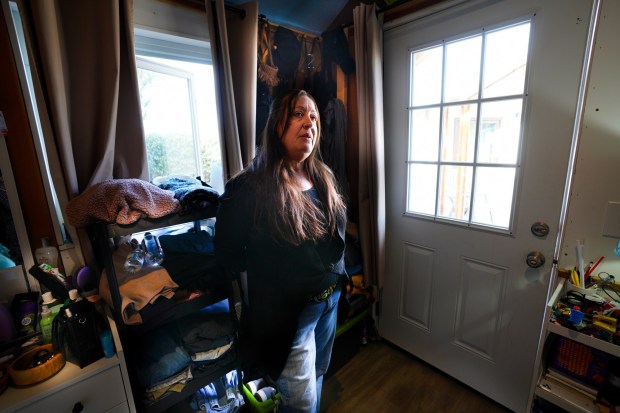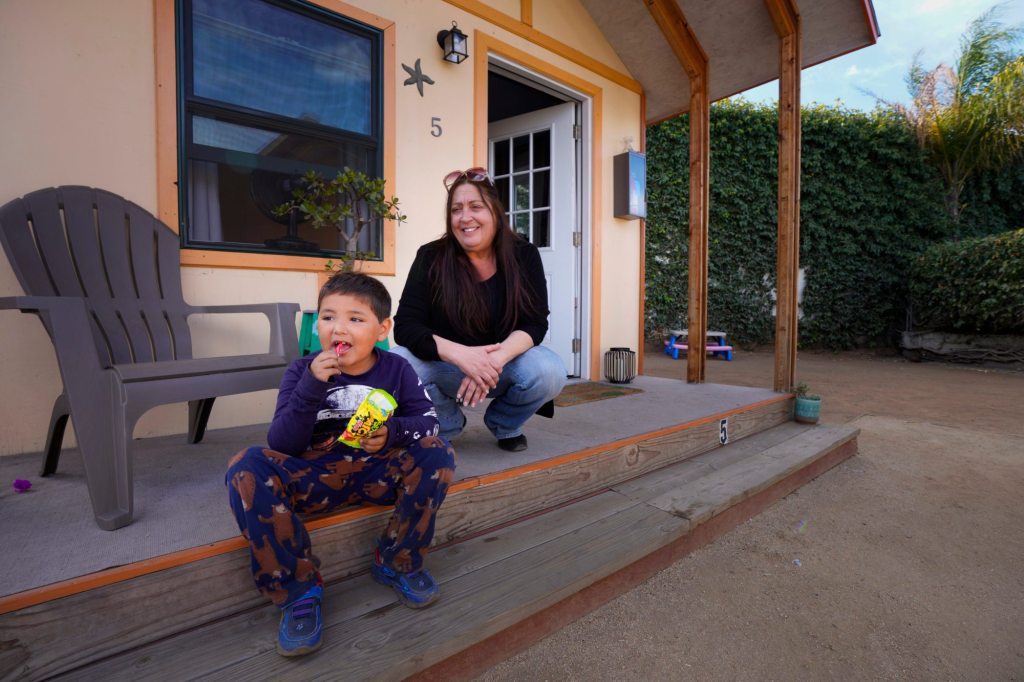A program to temporarily house homeless women and children in small cabins at an El Cajon church has resulted in most clients finding permanent housing in the past two years and, with the city's blessing, will continue indefinitely.
The nonprofit Amikas, which oversees the emergency sleeping huts, has been promoting the small structures for years as a dignified, comfortable and safe way to provide shelter for the homeless. El Cajon was the first city in the county to agree to temporarily allow them at Meridian Baptist Church in 2020, but only on a temporary basis.
It would take another two years for the village to open with seven cabins, including a unit used as a shared kitchen and office, with the first customer moving in on December 31, 2022.
The church only allows women and children into the program, and the city's conditions included ending the pilot program on December 31, 2024.
Without much fanfare or discussion, the El Cajon City Council agreed to delete the words “pilot program” and all references to the expiration date at its Dec. 10 meeting, allowing the program to continue indefinitely under a government building permit.
The Rev. Rolland Slade, the church's senior pastor and Amikas board member, said he attended the meeting and was willing to speak, but found he didn't need to.
“I guess it was their way of saying, 'We're okay with it, it wasn't a problem for us, let's keep it going,'” he said.
Slade said he would like to expand the program to 10 cabins and hopes other cities will be willing to start their own villages after seeing the success in El Cajon. So far, however, there have been no interested parties, although this is evidence that such a program could easily exist.
“We have not received any calls to El Cajon police,” he said. “We didn’t have any eviction problems.”
The cabins are 12 feet by 12 feet, have a porch, and have electricity but no plumbing. The small village is invisible from the road, and one afternoon the only noise came from a few young girls giggling and riding their bikes across the dirt parking lot.
Since its opening, the village has been a temporary home for 45 people, including 27 women and their children or grandchildren. Of these, 21 women moved into an apartment, i.e. 78%. By comparison, about 17% of people in shelters overseen by the San Diego Housing Commission have moved out to permanent housing in the current fiscal year, according to commission data.
The 11 people now staying at Meridian Church Village include Carol Ortiz and her grandson Zayden, who have been in their cabin since Sept. 26.

Although their stay exceeded the official 90-day limit, there are exceptions for people who are actively seeking housing, Slade said.
Ortiz, 55, has two part-time jobs in security and said she may have a third job, also part-time. Since she takes home about $1,200 a month, she said she needs to find a full-time job to afford the rent.
Before moving to San Diego in February to be with her son, daughter and grandson, Ortiz worked as a credit manager at a New York radio station for 11 years and in human resources at IBM for 13 years.
With everyone living in a small apartment when she arrived in San Diego, she said tensions at home prompted her to move out.
She found temporary housing but ended up spending a night on an El Cajon bench before someone connected her with the Amikas program.
“This is the first time I've been in a situation like this and I was scared to death,” she said, adding that she was afraid to go to a shelter.
“You know what?” she said. “This place is great. Not only have they given me a place to stay here, they have given me food and shelter over my head, and he and I are safe. But they also help me get medical care.
“I also get a phone consultation twice a month because I needed it,” she continued. “I didn’t think I would have done it, but I did. I just couldn't stop crying for the first two months. The thought of it all was just so scary. Because what are you doing?”
At least one El Cajon City Council member is open to the idea of expanding the Amikas program.
The program was presented to the El Cajon City Council in 2020 by Councilman Steve Goble, who made a request to the city council in November to use some federal American Rescue Plan Act funds for additional cabins at the church. However, City Manager Graham Mitchell said the funds could not be used for the program because the area for the sleeping quarters is currently not allowed to expand.
Originally published:
